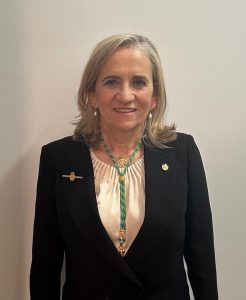- Her inaugural speech as Corresponding Academic focused on ‘Pharmaceutical Nanotechnology as a Key Player in the Paradigm of Advanced Therapies’
Santiago de Compostela, November 28, 2024.- María José Alonso, Professor of Pharmacy and Pharmaceutical Technology at the University of Santiago de Compostela (USC), was inducted today as a Corresponding Academic of the National Academy of Pharmacy and Biochemistry of Argentina. In her inaugural speech, presented by academic Marcelo Nacucchio, Professor Alonso spoke on ‘Pharmaceutical Nanotechnology as a Key Player in the Paradigm of Advanced Therapies’. The virtual ceremony saw her receive her honors from the Academy’s President, Virginia Martino.
María José Alonso expressed that this election “is a great honor, and I would like to thank the Academy and all those who have supported me throughout my career.”
Her election to the National Academy of Pharmacy and Biochemistry of Argentina is yet another recognition of Professor Alonso’s outstanding career from international scientific institutions, following her election as a member of the National Academy of Medicine of the United States (NAM) in 2016, the prestigious College of Fellows of the American Institute for Medical and Biological Engineering (AIMBE) in 2017, the College of Fellows of the Controlled Release Society (CRS) in 2018, and the Royal Academy of Medicine of Belgium in 2021. She is also a member of the Royal Academy of Pharmacy of Spain, the Royal Academy of Pharmacy of Galicia, and the Royal Galician Academy of Sciences.

Research Career
María José Alonso is a full professor of Biopharmaceutics and Pharmaceutical Technology at the University of Santiago de Compostela (USC). From 2006 to 2010, she served as Vice-Rector for Research and Innovation at USC. She has worked as a visiting scientist at Paris XI University (1986-87); Angers University (1989); and MIT, during 1991-1992 and again in 2012.
Her laboratory (http://www.usc.es/grupos/mjalonsolab/), a pioneer in Spain in the field of Pharmaceutical Nanotechnology, has over 3 decades of experience in the formulation of biological drugs and vaccines. In the last two decades, it has particularly excelled in the development of nanomedicine candidates based on monoclonal antibodies, as well as vaccines and therapies based on RNA. Its area of application ranges from infectious and autoimmune diseases to cancer and neurodegenerative diseases.
María J. Alonso has coordinated several research consortia funded by the WHO, the Gates Foundation, and the European Commission, and participated in 16 international projects. With more than 310 scientific publications, she is the most cited author in Spain in the field of Pharmacy and Pharmacology (H-index 103), and ranked among the TOP TEN in Pharmacology (Times Higher Education global ranking, 2010). She also appears on The Medicine Maker’s Power List of the most influential researchers in Biopharmaceutics (2020). Furthermore, she has been very active in transferring her knowledge to industry, holding 22 patent families, most of which have been licensed to industry, and she is involved in two start-ups.
She has been active within the Controlled Release Society (CRS), the leading global scientific society in drug delivery and nanomedicine, having served as its President from 2017 to 2019. She is also Editor-in-Chief of Drug Delivery and Translational Research, an official CRS journal, and serves on the editorial boards of 12 scientific journals.
She has received numerous awards, including the ‘Juan de la Cierva’ National Research Award, the ‘Excellence in Research and Education Medal’ from the Spanish Government, the ‘Jaime I Award’, the ‘Castelao Medal’ from the Xunta de Galicia, and other awards from scientific organizations and foundations.
She is a member of the College of Fellows of the American Institute for Medical and Biological Engineering (AIMBE) and a Fellow of the Controlled Release Society; a member of two academies in Galicia, the Royal Academy of Pharmacy of Spain (RANF), the National Academy of Pharmacy and Biochemistry of Argentina, the Royal Academy of Medicine of Belgium, and the National Academy of Medicine of the United States (NAM).
